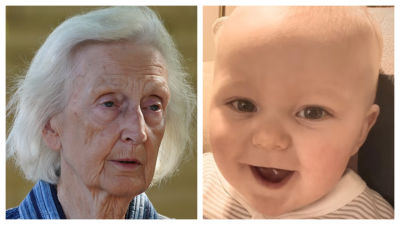Louis Thorold: Pensioner who caused fatal crash with baby not guilty on grounds of insanity

An elderly driver who caused a crash which killed a baby in his pram has been cleared of death by careless driving on grounds of insanity.
Jurors found that Shelagh Robertson's undiagnosed dementia had affected her driving when she pulled in to the path of a van which then mounted the pavement, killing five-month-old Louis Thorold.
Robertson, 75, was driving home from a shopping trip to Tesco when she turned into the path of an oncoming van on the A10 at Waterbeach in Cambridgeshire on January 22 last year, a trial at Cambridge Crown Court heard.
The van collided with Robertson's car, forcing the van onto the pavement, where it hit Rachael Thorold and her son Louis Thorold, killing him and throwing Mrs Thorold into the air, causing her serious injuries.
The judge, Mark Bishop, told jurors that if they were satisfied on the balance of probabilities that Robertson, of Stables Yard in Waterbeach, had dementia at the time and either did not know what she was doing or did not know that what she was doing was wrong, they could return a special verdict of not guilty by reason of insanity.
He said that this “doesn’t include a momentary failure to concentrate”.
Jurors found Robertson not guilty by reason of insanity on Friday following seven hours and three minutes of deliberations.
The defendant, who sat beside her solicitor and a family member in the well of the court, used a hearing loop to listen to the jury foreperson read out the verdict.
Robertson appeared expressionless as the verdict was returned.
Louis’s parents Chris and Rachael Thorold, who sat in the public gallery, looked down at the floor, with Mr Thorold shaking his head.
James Leonard, defending, told the trial it was “obvious” Robertson’s driving “fell below the standard of a reasonable and competent driver”.
But he said that Robertson was “ill-equipped to negotiate” the junction due to her dementia, and she was unaware of this as she was undiagnosed at the time.
“She’s trying to be safe but she just doesn’t have the presence of mind to be safe,” Mr Leonard said.
Prosecutor David Matthew had said in his closing speech: “There’s no doubt here that Shelagh Robertson is suffering from a form of dementia and was suffering from it in January 2021.”
He said that an MRI scan of Robertson’s brain which showed shrinkage of a part of the brain associated with memory and language, taken in September or October of last year, is “strong evidence of that”.
But he raised the question of “where on the slope of dementia Shelagh Robertson was in January 2021”, adding: “It’s not just a question of whether someone has dementia, it’s a question of how bad is it,” he said.
Adam Zeman, professor of cognitive behavioural neurology at the University of Exeter, was instructed by defence lawyers to compile a report on Robertson.
He told jurors that the defendant had “dementia caused most probably by Alzheimer’s disease in a slightly atypical presentation”.
Prof Zeman said Robertson would have been at “high risk of becoming confused at that junction and one possible outcome of the confusion would be to look the wrong way”.
The expert witness added that Robertson had “few close relatives” and her husband was “severely unwell”, which was significant as “it’s often the spouses who bring you along” for a dementia diagnosis.
'Speak up with concerns'
Det Sgt Mark Dollard, from Cambridgeshire Police's road policing unit, said: “This was an extremely tragic and sad incident and our deepest condolences go out to Louis’ family.
“We carried out a thorough and exhaustive inquiry, however, regardless of the verdict nothing will ever bring Louis back and his family will have to live with that for the rest of their lives.
“It is however, a stark reminder of how important it is for anyone who gets behind the wheel of a vehicle to be competent and capable of driving safely.
"I would urge anyone who is concerned about a family member or friend and their ability to drive to speak up, discuss your concerns with your loved one or alternatively speak to your GP who can submit their concerns to the DVLA."
Want a quick and expert briefing on the biggest news stories? Listen to our latest podcasts to find out What You Need To Know.